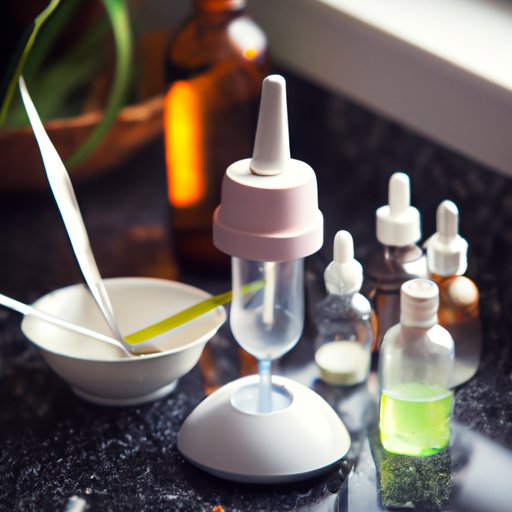
I. Introduction
Post nasal drip is a common condition characterized by excess mucus buildup in the back of the throat. It can cause symptoms such as a sore throat, coughing, and nasal congestion, which can significantly impact one’s quality of life. Finding a cure for post nasal drip is imperative, and luckily, there are several natural remedies, over-the-counter medications, and lifestyle changes that can effectively alleviate symptoms.
II. 7 Natural Remedies for Post Nasal Drip
Saline rinses, nasal irrigation, steam inhalation, ginger, honey, apple cider vinegar, and eucalyptus oil are natural remedies that can help ease the discomfort of post nasal drip. Saline rinses and nasal irrigation can flush out excess mucus and moisturize the nasal passages. Steam inhalation can also help loosen and relieve congestion. Ginger, honey, and apple cider vinegar have anti-inflammatory properties that can ease inflammation and thin out mucus. Eucalyptus oil can help relieve nasal congestion and promote overall respiratory health.
III. Understanding and Treating Post Nasal Drip: A Beginner’s Guide
In this beginner’s guide, we will delve into the causes and symptoms of post nasal drip, as well as the basic principles of treating it. Identifying underlying conditions that can trigger post nasal drip is crucial. Additionally, treating allergies, infections, and acid reflux, which are common contributors to post nasal drip, can also alleviate symptoms.
IV. The Top 5 Over-the-Counter Medications for Post Nasal Drip Relief
Over-the-counter medications such as antihistamines, decongestants, nasal sprays, mucolytics, and corticosteroids are effective in relieving post nasal drip symptoms. Antihistamines can help reduce inflammation caused by allergies, while decongestants can help constrict blood vessels and reduce congestion. Nasal sprays and mucolytics can help break up and thin out mucus. Corticosteroids can help reduce inflammation caused by allergies or infections.
V. Breaking the Cycle of Post Nasal Drip: Lifestyle Changes That Can Help
Lifestyle changes such as maintaining good oral hygiene, staying hydrated, avoiding irritants, managing stress, and quitting smoking can help break the cycle of post nasal drip. Brushing and flossing regularly and using mouthwash can help reduce bacteria and germs in the mouth and throat. Staying hydrated and avoiding irritants such as smoke, pollution, and chemicals can help reduce symptoms. Managing stress through exercise, relaxation techniques, and therapy can also be beneficial in alleviating post nasal drip. Quitting smoking is also crucial, as it can exacerbate symptoms.
VI. Relief in a Cup: The Best Teas for Soothing Post Nasal Drip Symptoms
Teas such as peppermint, ginger, chamomile, echinacea, and green tea have properties that can help alleviate post nasal drip symptoms. Peppermint tea has anti-inflammatory properties that can help reduce inflammation and relieve pain. Ginger tea can help reduce inflammation and provide relief from congestion. Chamomile tea has anti-inflammatory and antioxidant properties, which can improve the immune system and relieve inflammation. Echinacea tea can help boost the immune system and relieve inflammation. Green tea has antioxidant and anti-inflammatory properties that can help alleviate symptoms and improve overall respiratory health.
VII. Eliminating Triggers: How to Identify and Avoid Foods That Cause Post Nasal Drip
Certain foods such as dairy, sugar, and caffeine can trigger post nasal drip symptoms. Dairy products can increase mucus production, while sugar and caffeine can cause dehydration and inflammation, exacerbating symptoms. Identifying and avoiding these trigger foods can help alleviate post nasal drip symptoms. Eating a balanced and healthy diet rich in fruits, vegetables, and whole grains can also improve overall respiratory health.
VIII. What a Doctor Wants You to Know About Post Nasal Drip: Diagnosis and Treatment Options
If symptoms persist or become severe, it’s important to seek medical attention. A doctor can perform tests to diagnose any underlying conditions such as allergies, infections, or acid reflux that may be causing post nasal drip. Treatment options may include medication, allergy shots, or surgery, depending on the severity of symptoms and the underlying condition.
IX. Conclusion
In conclusion, post nasal drip is a common condition that can cause significant discomfort. However, there are several natural remedies, over-the-counter medications, and lifestyle changes that can alleviate symptoms. Trying these treatments, avoiding trigger foods, and seeking medical attention when necessary can help break the cycle of post nasal drip and improve overall respiratory health.




